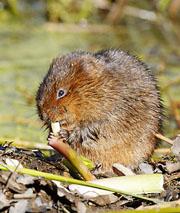 Water voles are easily stressed.© SPL
Water voles are easily stressed.© SPLTagging water voles with radio-transmitter collars causes a shift in the sex ratio of new births, researchers have discovered. This indicates that the animals might be under stress and the finding suggests that the technique might harm other species too.
Numbers of water voles (Arvicola terrestris) are declining in Britain, mainly because of habitat loss and increased abundance of their main predator, the American mink (Mustela vison).
Tom Moorhouse of the University of Oxford has been studying dispersal and mating behaviour of a population of water voles in Norfolk. Three years ago, he started tagging selected individuals with radio collars.
“The study illustrates the importance of investigating the impacts of invasive monitoring.”
Zoe Jewell
Rhinowatch
Over the course of the project, the proportion of female offspring compared with males dropped by 48%. He believes that the collars, which consist of a small radio transmitter and a battery, must have stressed the animals1.
Voles are known to raise more males in hard times, for example when there is little food around. That is thought to be because males are not tied to their original habitat, and so have a better chance of successfully breeding elsewhere.
"Radio-collar stress seems to cause sex-ratio adjustments similar to those caused by food scarcity," Moorhouse says. But he has yet to discover whether the same mechanism is affecting the sex ratio in both cases.
Wild thing
Radio tracking is a common method for studying the behaviour of wild mammals, including polar bears, rhinos and wolves. But it has been unclear whether and how the collars might affect behaviour, reproduction and survival in these animals.
Researchers studying panda populations in China, for example, are not allowed to use radio collars, in case they harm the sensitive animals.
A study published last year reported harmful effects on penguins whose flippers were marked with metal bands (see ""ID bands may harm penguins":http://www.nature.com/news/2004/040517/full/040517-5.html" ). Marked king penguins (Aptenodytes patagonicus) experienced difficulties with fishing and swimming, and had problems reaching their breeding grounds.
ADVERTISEMENT
The Norfolk study provides evidence that such negative effects exist in mammals too. "This is a highly significant study," says Zoe Jewell, a zoologist with Rhinowatch, a rhinoceros conservation project in Zimbabwe, who has studied the effect of monitoring on rhino fertility.
"It illustrates the importance of carefully investigating the possible impacts of invasive monitoring and management strategies on wild animals," she says.
Jewell has developed a footprint identification method for counting and monitoring black rhino (Diceros bicornis)2. But there are currently no effective alternatives for marking smaller mammals and birds.
Moorhouse says that more research is needed to prove that the collaring is definitely causing the sex-ratio shift that he saw in the voles. In the meantime, he adds, there are many ecological questions that can be solved without radio tracking.
Rhinowatch
